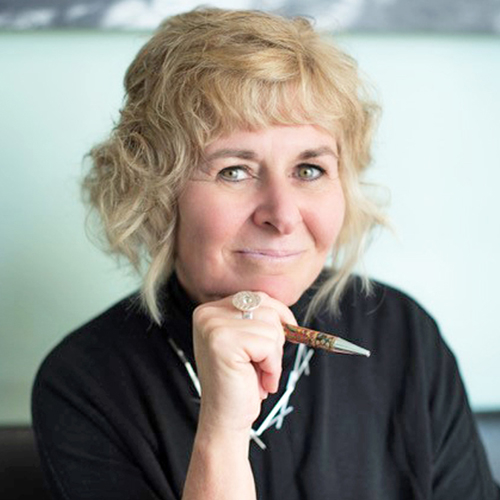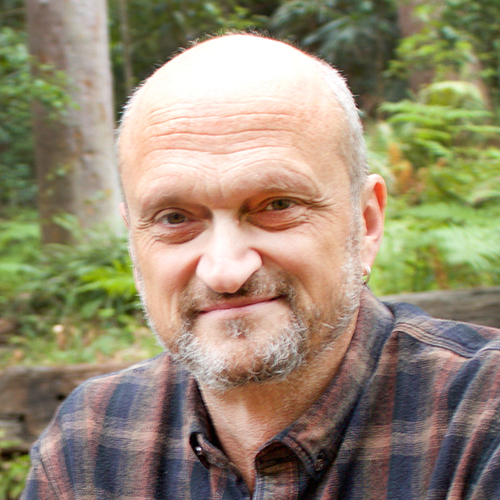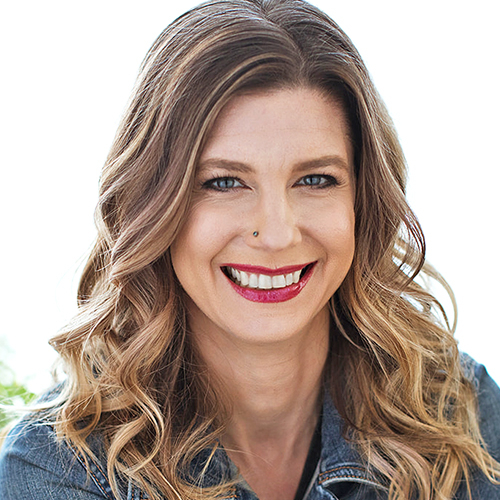Early Years: Connecting the Dots from 0-3
GOLD Learning is excited to introduce the newest member of the GOLD symposium family! GOLD Early Years provides the latest evidence-based continuing education for health care professionals working with families with children aged 0-3 years. As research in the area of early childhood brain development and the importance of healthy relationships grows, it's more important than ever for health care professionals to stay up to date. Professionals have an important role to play in supporting healthy childhood environments that promote optimal brain development and mental health for infants and young children.
Previously known as GOLD Learning Early Years Online Symposium 2021.


Kim Barthel is an award-winning occupational therapist, trans-disciplinary teacher and best-selling author who is actively supporting function and healing in many cultures. A pioneer in reinforcing the importance of relationship, Kim’s passionate interests include complex behaviour, attachment, sensory processing, trauma-sensitive practice, Neuro-Developmental Treatment and mental health. Kim’s mission is to support the conscious evolution of the human spirit. www.kimbarthel.ca
1. Describe the deep impact that early trauma has upon brain development, relational skills, coping strategies and behaviour.
2. List the red flags that are suggestive of relational trauma, and complexities when coupled with developmental disability.
3. Describe the value of attunement and “holding space” as a force for co-regulation, healthy brain wiring/re-wiring, self-esteem and learning.
This session invites early childhood professionals to learn more about the science of infant development, particularly the impact that early trauma and stress can have on the brain, behaviour, learning and relationships throughout the lifespan. Attachment, attunement, co-regulation, sensory processing and creating optimal interpersonal relationships between infants and caregivers are highlighted. While an infant may inherit challenges trans-generationally, from developmental disability, from an early life event or a chaotic home, how their closest caregivers interact with them has direct and significant impact on their well-being both mentally and physically. Enhancing trauma-sensitive caregiving in the earliest years is critical as a foundation for children to become their best selves.


Lisa Dion, LPC, RPT-S, is an international teacher, creator of Synergetic Play Therapy, founder and President of the Synergetic Play Therapy Institute, and host of the Lessons from the Playroom podcast. She is the author of Aggression in Play Therapy: A Neurobiological Approach for Integrating Intensity and is the 2015 recipient of the Association for Play Therapy’s Professional Education and Training Award of Excellence.
1. List the different states of activation of the Autonomic Nervous System.
2: Explain what regulation is and what it is not.
3: Explain what "a child borrows the adult's nervous system" means as their own regulatory capacity develops.
Research in neuroscience and interpersonal neurobiology sheds light on the need for parents/caregivers to act as their child's external regulator during states of dysregulation as the child learns how to self-regulate. When activated, children need to borrow the parent's regulatory capacity as their own regulatory system is developing. Without an understanding of what regulation is and what it isn't and the importance of parents knowing how to regulate their own arousal states, parents may inadvertently be increasing the child's dysregulation instead of helping to modulate it for integration. Over time, this can significantly impact the parent's ability to stay attuned and present to the child, as well as themselves. It can also lead to a child's regulatory system not being patterned to its optimal potential. In this discussion, Lisa Dion will discuss what regulation is and is not helping participants understand what it really takes to create a deep connection.


Robin Grille is a psychologist in private practice and a parenting educator. He is the author of three internationally acclaimed books: ‘Parenting for a Peaceful World’, ‘Heart to Heart Parenting’ and ‘Inner Child Journeys’. Robin has delivered his seminars and workshops throughout Australasia, North America, UK and Asia. His experiential, skills-based and informational parenting courses have helped many people to embrace parenting as a transformative, personal growth journey.
Drawing from 30 years’ clinical experience and from leading-edge neuropsychological research, Robin’s seminars and courses focus on healthy emotional development for children as well as parents; while building supportive, co-operative parenting communities. Robin’s work is animated by his belief that humanity’s future is largely dependent on the way we collectively relate to our children.
To find out more about Robin Grille’s work, his books, articles and seminars visit: www.robingrille.com
Topic: Inner Child Co-Regulation – How Empathic Dialogue Can Clear Implicit-Memory Blocks to Bonding - [View Abstract]
2. Describe the neuropsychology of body-flashbacks, and their positive and negative impacts on parent-infant bonding.
3. Describe signs that painful emotional (implicit) memory has been triggered for a parent.
4. Describe the evolutionary purpose of implicit memory.
5. Describe how empathic dialogue can help release emotional blocks to pleasurable bonding (the power of empathic listening, and how it mimics maternal holding).
6. Assess how to ask good questions! – how to safely invite a deeper, more personal and self-disclosing level of dialogue.
7. Explain what constitutes good listening .
8. Describe a simple, 5-step dialogical process to assist clients to release painful emotional memory, and become attentive to the present moment with their child.
An increasing number of research studies and psychotherapists’ accounts address the phenomenon in which parents’ attachment histories play a major role in their emotional capacity for pleasurable bonding with their own baby. Birth trauma, childhood trauma, insecure or disorganized early attachment can all carry forward as unconscious, implicit memory (emotional memory) that, in stressful circumstances, can arise and interfere with parent-infant bonding.
However, when a parent is able to communicate aspects of their historical pain, shock or distress, within a context of empathic and validating dialogue, this can often clear the way for pleasurable and spontaneous bonding.
Health practitioners are in a unique position to invite and hold an empathic dialogical space, in which parents can feel emotionally safe enough to tell a little of their own story. This can make a significant difference to parents’ emotional capacity for sustained attachment with their infant.


Robyn Gobbel, LMSW-Clinical, has over 15 years of practice in family and child therapy experience, specializing in complex trauma, attachment, and adoption. Robyn is a therapist, trainer, and consultant who recently relocated to Grand Rapids, MI from Austin, TX.
Robyn's diverse clinical training includes EMDR (including EMDR adapted for children with attachment trauma), Somatic Experiencing, Theraplay, Trust Based Relational Intervention®, Circle of Security Parent Educator, The Alert Program® and Yogapeutics Aerial Yoga Level 1 Teacher Training. Robyn has integrated these training modalities with a foundation of attachment theory and the relational neurosciences to create an attachment-rich, sensory-sensitive, and relational neurosciences supported healing environment for children and families.
Robyn consults, teaches, and trains extensively throughout the US, including previously as an instructor for the Foundations of Interpersonal Neurobiology Certificate Program at Portland Community College. She was an instructor with the Adoptive & Foster Family Therapy Post-Graduate Certificate Program and has served on the working board of the Global Association for Interpersonal Neurobiology Studies (GAINS).
2. Describe how to encourage the development of the parasympathetic branch/ventral vagal nerve through mirroring and co-regulation.
3. List three activities that support the development of the regulatory parts of the brain, ultimately leading to improved behavior.
Research emerging from Relational Neuroscience, including polyvagal theory, regulation theory, and the neurosequential model of development, has shifted our understanding of the origins of behavior. When parents, caregivers, and child development professionals are armed with the latest science about what behavior really is, they increase their capacity for connecting with dysregulated behavior in a way that promotes positive growth and development of the relational, social, and behavioral brain of the child. This workshop will briefly summarize the latest research from the relational neuroscience and then move into practical interventions that will help caregivers soothe difficult behaviors while promoting attachment, regulation, and stress resilience.


Dr. Ruth Oshikanlu MBE is a multi-award winning nurse, midwife and health visitor. A nurse entrepreneur, consultant, leader and parenting expert, she is passionate about supporting vulnerable children and their families to reduce health inequalities and improve their life outcomes. Her previous roles include: HIV specialist midwife, Family Nurse at one of the first pilot sites of The Family Nurse Partnership intensive home visiting parenting programme for vulnerable families, and Nurse Leader of The Lewisham Young People’s Health and Wellbeing Service.
Ruth is a Pregnancy Mindset Expert and supports pregnant women who have had assisted conception or previous pregnancy loss. She is the author of Tune In To Your Baby: Because Babies Don’t Come with An Instruction Manual.
Ruth is a Queen’s Nurse, Fellow of The Institute of Health Visiting, Royal College of Nursing and The Royal Society of Arts. She is the recipient of several national healthcare and business awards; a regular columnist and has published several feature articles in numerous national nursing and healthcare journals.
Ruth was appointed a Member of the Order of the British Empire (MBE) in the New Year 2019 Honours List for being an Ambassador for the Health Visiting Profession and for services to Community Nursing, Children and Families. She is a Churchill Fellow and was awarded an honorary doctorate degree from London South Bank University in November 2019.
Topic: Foetal Programming and the Impact of Stress - [View Abstract]
2. Describe The importance of building therapeutic relationships with clients.
3. Discuss how professionals can be better equipped to support pregnant women/mothers and their partners with stress in pregnancy and the first three years of life including practical tools.
4. Discuss the use of antenatal attachment scales to discuss and suggest ways of promoting antenatal attachment to expectant parents.
5. Explain how to utilize trauma-informed practices to support women and their partners.
Foetal programming refers to changes in the environment in utero during specific critical or sensitive periods and the long-term effect on the child. Maternal stress and anxiety during pregnancy represents an important aspect of the intrauterine environment and can alter the development of the foetus and child and can influence many, if not all, developmental outcomes. The presentation will explain what foetal programming is, why it matters and discuss how stress impacts it. It will discuss the importance of building therapeutic relationships with clients and their families. It will conclude with the tools and strategies to equip professionals who work with women, children and their families to better support them in pregnancy and the first three years of life.


Marianne is a mother of four grown-up, home-birthed and breastfed daughters and granny of five beautiful home-birthed, breastfed grandchildren. After a personal experience with breastfeeding practices in a hospital, she became a volunteer for the Dutch breastfeeding association in 1994 and for many years, she led big groups for pregnant and breastfeeding mothers in her home town.
She became an IBCLC in 2008 and launched her private practice, from which she does consultations, book translations (such as James McKenna’s book ‘Sleeping With Your Baby’ and recently ‘Safe Infant Sleep’, and Jill and Nils Bergman’s book ‘Hold Your Prem’), blogging and writing on youth healthcare, advocating for policies that generously take neurophysiological and sociocultural convictions into account. Translating and avid reading widened Marianne’s insights and field of interest, leading her her to Cultural Anthropology & Development Sociology at the University of Amsterdam and subsequently a master’s degree in Medical Anthropology & Sociology.
Combining several fields, she co-founded the initiative ACE Aware NL early 2020, chiming in with similar movements in Scotland and California, US. The aim is to increase awareness around Adverse Childhood Experiences and their impact on adult health and wellbeing. Now that science abundantly shows the importance of sensitive and responsive parenting for overall health and wellbeing, all sectors in society deserve to know what a world of difference they can make in a child's life if they succeed in incorporating trauma-sensitive approaches . Marianne expects to remain strongly tied to this field for the rest of her life.
1. Give a basic description of the difference between a pathogenic and a salutogenic approach.
2. Understand why health cannot be seen in a depoliticised way, through concepts like Sense of Coherence, Positive Health, Authoritative Knowledge, Uncomfortable Knowledge, Biosocial Inheritance and Adverse Childhood Experiences (ACEs).
3. Describe the buffering effect of Positive Childhood Experiences (PCEs) and how they can create resilience in children.
There is a growing awareness about the impact of Adverse Childhood Events or ACEs and the toxic stress they can create during a child’s formative years. So far much of the research and conversation has focused on identifying ACEs and the negative life-long consequences they can have. How can we reframe the conversation to shift from focusing on reacting to negative outcomes, to creating the caring connections that promote healthy brain development and stress regulation? To feel healthy, people of all ages look for a meaningful existence with loving and caring relationships. In the Salutogenic Model of Health this is called the Sense of Coherence (SoC). When the SoC is under strain, this can cause pain and trauma that both parent and child express in behaviours that are difficult to handle for themselves and others. As innately and intensely social beings, humans actively try to connect to others to build positive, contextualised relationships that support health and wellbeing and create social resources. Therefore, secure childhoods and nurturing social environments are likely to increase lifelong resilience. Looking at health from a salutogenic perspective can help us understand that health and wellbeing cannot simply be depoliticised and decontextualized as an individual responsibility. ACEs are not always preventable, but we have the power to help both parents and professionals create the positive childhood experiences (PCEs) that buffer the negative ones and create resilience.
Accreditation
American Montessori Society (AMS) CPD Hours
This activity is approved by the American Montessori Society for 6 AMS CPD Hours.
CERPs - Continuing Education Recognition Points:
Applicable to International Board Certified Lactation Consultants (IBCLCs), Certified Lactation Counsellors (CLCs), Certified Lactation Educators (CLEs), Childbirth Educators (CBEs) and doulas. GOLD Learning is designated as a Long Term Provider of CERPs by the International Board of Lactation Consultant Examiners (IBLCE) -Approval #CLT114-07. This activity is approved for 6 R-CERPs.
If you have already participated in this program, you are not eligible to receive additional credits for viewing it again. Please send us an email to [email protected] if you have any questions.
Additional Details
Viewing Time: 8 Weeks
Tags / Categories
(IBCLC) Psychology, Sociology, and Anthropology, Attachment & Relationships, Child Behavior & Dysregulation, Fetal Development & Growth, Fetal Programming and Bonding (Affects Infants and Beyond), Stress & Child Development
How much time do I have to view the presentations?
- The viewing time will be specified for each product. When you purchase multiple items in your cart, the viewing time becomes CUMULATIVE. Ex. Lecture 1= 2 weeks and Lecture Pack 2 = 4 Weeks, you will have a total of 6 weeks viewing time for ALL the presentations made in that purchase.
- Time for viewing the talks begins once you purchase the product. For Live Webinars & Symposiums, the viewing period begins from when the live event takes place. Presentations can be accessed 24/7 and can be viewed as many times as you like during the viewing period.
What are bundled lectures?
- Presentations may be available individually or via a bundled package. Bundled lectures are a set of lectures that have been put together based on a specific category or topic. Some lectures will be available in both individual and lecture form, whereas others will be available only via a bundled lecture pack.
Will there be Handouts?
- YES! Each lecture comes with a PDF handout provided by the Speaker.
Some lectures include a Q&A, what does that mean?
- During our online conferences, presentations that occur live are also followed by a short 15 minute Question & Answer Session. The Speaker addresses questions that were posted by Delegates during the presentation. We include the recording of these Q&A Sessions as a bonus for you.
How can I receive a Certificate?
- If this presentation offers a certificate, once you are done viewing the lecture or the lectures within a bundle, submit your attendance record in order to be able to download your certificate. You'll be able to see which credits are offered for the lecture by hovering over the "Credits Available" link within the "Speakers & Topics" tab.
Professionals that selected this package also viewed

|
|

|











